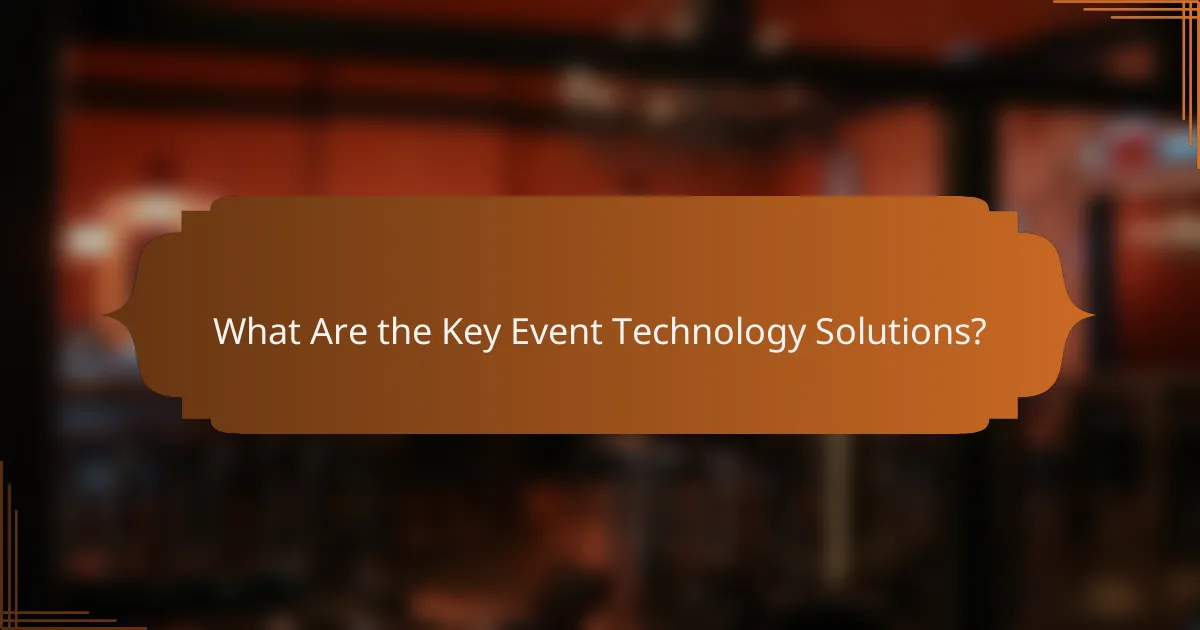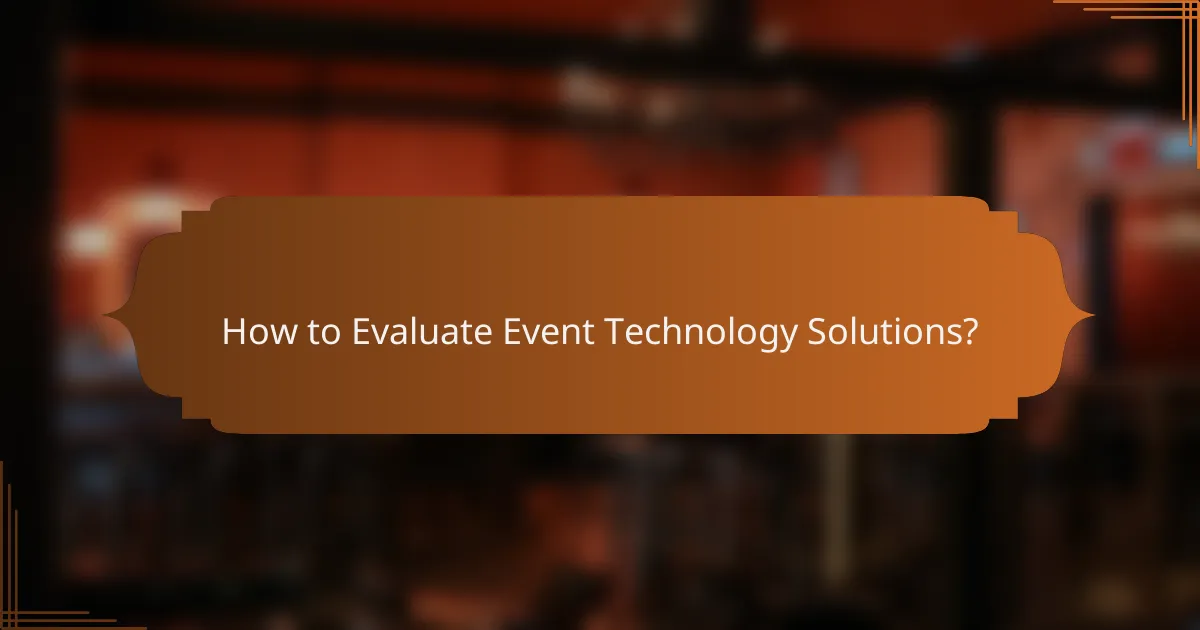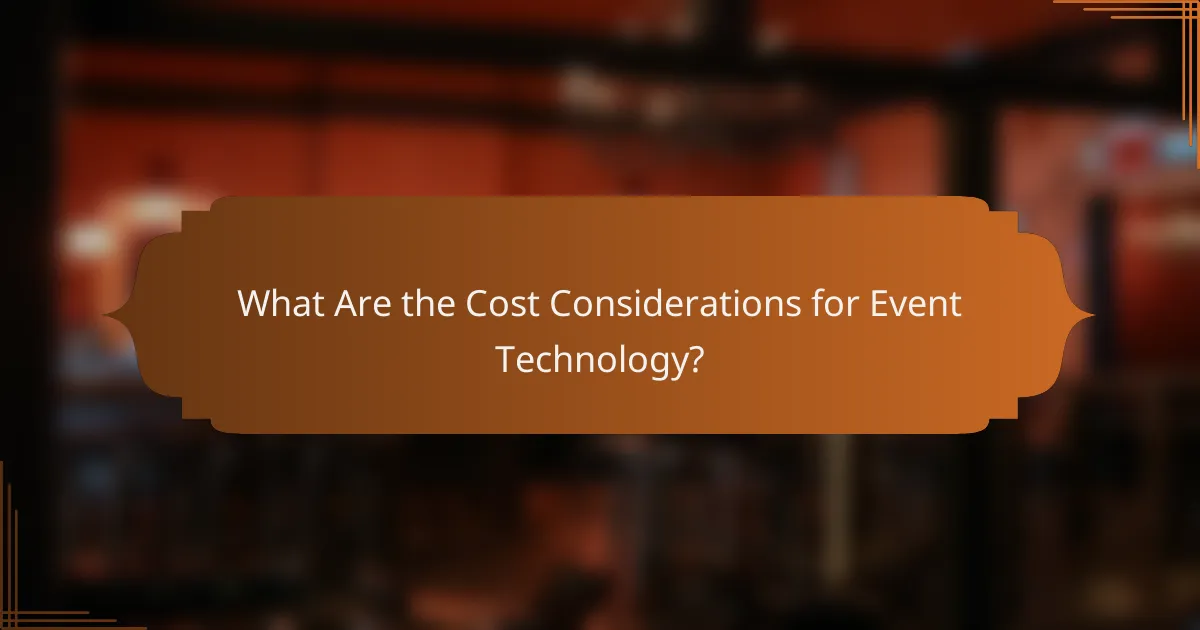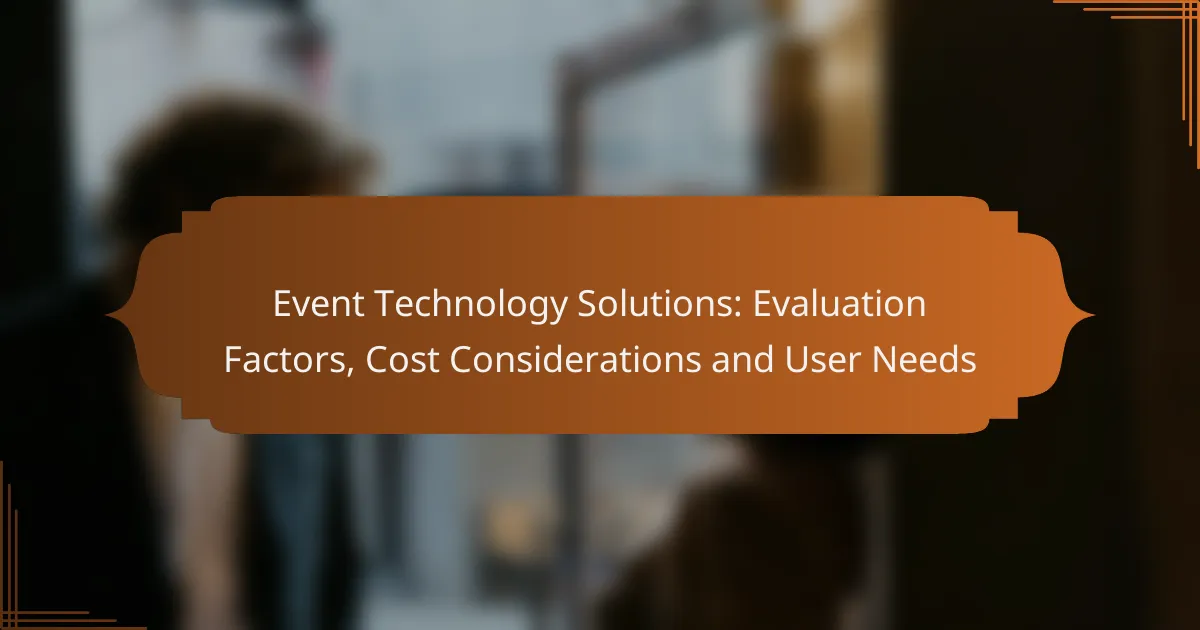Event technology solutions play a crucial role in optimizing the planning, execution, and analysis of events, offering tools for virtual and hybrid formats, management, audience engagement, and analytics. When evaluating these solutions, it is essential to consider usability, integration capabilities, and scalability to ensure they meet user needs and enhance attendee experiences. Additionally, understanding the cost factors, such as licensing fees and maintenance, is vital for effective budgeting and selecting the most suitable technology for successful events.

What Are the Key Event Technology Solutions?
Key event technology solutions encompass a range of tools designed to enhance the planning, execution, and analysis of events. These solutions include platforms for virtual and hybrid events, management software, audience engagement tools, and analytics systems, each serving distinct purposes to improve attendee experiences and streamline operations.
Virtual Event Platforms
Virtual event platforms facilitate online gatherings, allowing attendees to participate remotely. They typically offer features such as live streaming, chat functions, and networking opportunities, making them essential for fully online events.
When selecting a virtual event platform, consider factors like user interface, scalability, and integration capabilities with other tools. Popular options include Zoom, Hopin, and Microsoft Teams, which cater to various event sizes and formats.
Hybrid Event Solutions
Hybrid event solutions combine in-person and virtual experiences, enabling broader audience reach. These platforms support live streaming of physical events while allowing remote attendees to engage through interactive features.
Key considerations for hybrid solutions include audio-visual quality, reliable internet connectivity, and seamless integration between physical and virtual components. Providers like ON24 and Cvent offer tailored services to meet these needs.
Event Management Software
Event management software streamlines the planning process by providing tools for registration, ticketing, and scheduling. This software helps organizers manage logistics efficiently and track attendee information.
Look for features such as customizable registration forms, payment processing, and reporting capabilities. Popular options include Eventbrite and Bizzabo, which cater to various event types and sizes.
Audience Engagement Tools
Audience engagement tools enhance interaction during events, fostering participation through polls, Q&A sessions, and gamification. These tools are crucial for keeping attendees engaged and making events more interactive.
Consider tools like Slido and Mentimeter, which integrate easily with other platforms and provide real-time feedback. Effective use of these tools can significantly improve attendee satisfaction and retention.
Event Analytics Solutions
Event analytics solutions provide insights into attendee behavior and event performance, enabling organizers to make data-driven decisions. These tools track metrics such as attendance rates, engagement levels, and feedback scores.
When choosing analytics solutions, look for those that offer comprehensive reporting and integration with other event technologies. Tools like Google Analytics and Eventbrite’s analytics features can help assess the success of your events and inform future planning.

How to Evaluate Event Technology Solutions?
Evaluating event technology solutions involves assessing their usability, integration capabilities, and scalability. These factors help ensure that the chosen technology aligns with user needs and enhances the overall event experience.
Usability and User Experience
Usability focuses on how easy and intuitive the technology is for users. A solution should have a clean interface, clear navigation, and minimal learning curve, allowing event staff and attendees to engage seamlessly. Consider conducting user testing to gather feedback on the interface before making a decision.
Look for features that enhance user experience, such as mobile accessibility and real-time support. A solution that offers a mobile app can significantly improve attendee engagement by providing instant access to schedules, maps, and networking opportunities.
Integration Capabilities
Integration capabilities refer to how well the event technology can connect with other systems, such as CRM, marketing tools, and payment processors. A solution that integrates easily with existing software can streamline operations and reduce data silos. Check if the technology supports popular APIs for seamless data exchange.
Evaluate the extent of integration options available. Solutions that offer pre-built connectors or customizable APIs can save time and resources during implementation. Ensure that the integration process is straightforward to avoid complications post-deployment.
Scalability and Flexibility
Scalability is crucial for adapting to varying event sizes and types. A scalable solution can accommodate small meetings as well as large conferences without compromising performance. Look for technology that can handle increased user loads and additional features as your event grows.
Flexibility allows for customization based on specific event needs. Choose a solution that offers modular features, enabling you to select only what you need. This approach can help manage costs while ensuring that the technology meets your unique requirements.

What Are the Cost Considerations for Event Technology?
Cost considerations for event technology encompass various factors, including licensing fees, setup and customization costs, and ongoing support and maintenance. Understanding these elements helps organizations budget effectively and choose the right solutions for their events.
Licensing Fees
Licensing fees are often a significant part of the overall cost for event technology solutions. These fees can vary widely based on the software’s features, the number of users, and the duration of the license. Some providers offer tiered pricing models, allowing organizations to select a plan that fits their needs and budget.
When evaluating licensing options, consider whether a one-time purchase or a subscription model is more suitable for your organization. Subscription models typically offer lower upfront costs but may accumulate higher expenses over time.
Setup and Customization Costs
Setup and customization costs can add to the initial investment in event technology. These costs may include configuring the software to meet specific requirements, integrating with existing systems, and training staff on how to use the technology effectively. Depending on the complexity, these expenses can range from a few hundred to several thousand dollars.
To manage these costs, assess your organization’s technical capabilities. If you have in-house expertise, you may reduce expenses by handling some setup tasks internally. Otherwise, consider hiring a vendor with experience in your chosen technology to ensure a smooth implementation.
Ongoing Support and Maintenance
Ongoing support and maintenance are essential for keeping event technology running smoothly. These costs typically include software updates, technical support, and troubleshooting services. Many vendors offer support packages that vary in price based on the level of service required.
It’s advisable to factor in these ongoing costs when budgeting for event technology. Look for vendors that provide clear information about their support offerings and consider the potential impact of downtime on your events. Regular maintenance can help prevent costly disruptions and ensure optimal performance.

What User Needs Should Be Addressed?
Addressing user needs in event technology solutions is crucial for ensuring a seamless experience. Key factors include accessibility features, mobile compatibility, and data security and privacy, all of which significantly impact user satisfaction and engagement.
Accessibility Features
Accessibility features are essential for ensuring all users can participate in events. This includes options like screen reader compatibility, captioning for videos, and keyboard navigation support. Implementing these features not only meets legal requirements in many regions but also enhances the experience for users with disabilities.
When evaluating accessibility, consider tools that comply with standards such as the Web Content Accessibility Guidelines (WCAG). A good practice is to conduct user testing with individuals who have varying accessibility needs to identify potential gaps.
Mobile Compatibility
Mobile compatibility is vital as many users access event technology through smartphones and tablets. Solutions should be responsive, meaning they adapt to different screen sizes and orientations, ensuring a consistent user experience. Look for platforms that offer mobile apps or mobile-optimized websites.
To assess mobile compatibility, test the solution on various devices and operating systems. Aim for a loading time of under three seconds on mobile networks to minimize user frustration and drop-off rates.
Data Security and Privacy
Data security and privacy are critical considerations for any event technology solution. Users need assurance that their personal information is protected against breaches and misuse. Look for platforms that offer encryption, secure payment processing, and compliance with regulations like GDPR or CCPA.
To enhance data security, choose solutions that provide regular updates and have a clear privacy policy. Conducting periodic security audits can also help identify vulnerabilities and ensure compliance with the latest security standards.

What Are the Trends in Event Technology?
Event technology is rapidly evolving, with several key trends shaping the industry. These trends focus on enhancing attendee experiences, improving operational efficiency, and addressing environmental concerns.
Increased Use of AI
The integration of artificial intelligence (AI) in event technology is transforming how events are planned and executed. AI tools can analyze attendee data to provide personalized recommendations, automate scheduling, and enhance engagement through chatbots.
For instance, AI-driven platforms can predict attendee preferences based on past behavior, allowing organizers to tailor content and networking opportunities. This not only improves satisfaction but can also increase attendance rates.
Focus on Sustainability
As environmental awareness grows, event organizers are prioritizing sustainability in their technology choices. This includes using eco-friendly materials, minimizing waste, and opting for digital solutions that reduce the carbon footprint.
For example, virtual event platforms can eliminate the need for travel, while digital ticketing reduces paper use. Organizers should consider sustainability certifications and partner with vendors who share these values to enhance their event’s green credentials.
Enhanced Networking Opportunities
Modern event technology is improving networking by facilitating connections among attendees before, during, and after events. Features like matchmaking algorithms and interactive event apps enable participants to find and connect with like-minded individuals easily.
Utilizing tools that allow for virtual meetups and discussion forums can further enhance networking. Organizers should encourage the use of these technologies to foster meaningful interactions and build a sense of community among attendees.

How to Choose the Right Event Technology for Your Needs?
Choosing the right event technology involves assessing your specific requirements, budget, and the features offered by various solutions. Focus on tools that enhance attendee engagement, streamline operations, and fit within your financial constraints.
Evaluation Factors
When evaluating event technology, consider factors such as user-friendliness, scalability, and integration capabilities with existing systems. Look for solutions that offer features like registration management, ticketing, and analytics to enhance the overall event experience.
Prioritize platforms that provide robust customer support and training resources, as these can significantly impact your team’s ability to utilize the technology effectively. Additionally, assess the technology’s adaptability to different event formats, whether in-person, virtual, or hybrid.
Cost Considerations
Cost is a critical factor when selecting event technology. Solutions can range from low-cost options to premium packages, often priced based on features and the number of attendees. Determine your budget early and consider both upfront costs and ongoing fees, such as subscription models or transaction fees.
It’s wise to request demos or trial periods to evaluate the technology’s value against its cost. Be cautious of hidden fees, and ensure you understand the total cost of ownership over time, including potential upgrades or additional services.
User Needs
Understanding user needs is essential for selecting the right event technology. Gather input from stakeholders, including event planners, attendees, and sponsors, to identify must-have features and functionalities. This collaborative approach ensures the chosen technology aligns with the expectations of all parties involved.
Consider the demographics of your audience, as younger attendees may prefer mobile-friendly solutions, while others might prioritize accessibility features. Tailoring the technology to meet diverse user needs can enhance engagement and satisfaction during the event.



